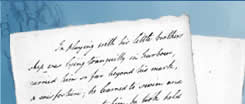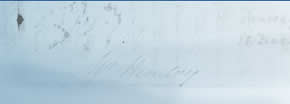[Isle of France, December 1809]
I can never speak of cats without a sentiment of regret for my poor
Trim, the favourite of all our ship's company on the Spyall. This good-natured purring animal was born on board His Majesty's ship the Roundabout in 1799 during a passage from the Cape of Good Hope to Botany Bay; and saving the rights and titles of the parish of Stepney, was consequently an Indian by birth. The signs of superior intelligence which marked his infancy, procured for him an education beyond what is usually bestowed upon the individuals of his tribe; and being brought up amongst sailors, his manners acquired a peculiarity of cant which rendered them as different from those of other cats, as the actions of a fearless seaman are from those of a lounging, shame-faced ploughboy; it was, however, from his gentleness and the innate goodness of his heart, that I gave him the name of my
uncle Toby's honest, kind-hearted, humble companion.
In playing with his little brothers and sisters upon deck by moonlight, when the ship was lying tranquilly in harbour, the energy and elasticity of his movements sometimes carried him so far beyond his mark, that he fell overboard; but this was far from being a misfortune; he learned to swim and to have no dread of the water; and when a rope was thrown over to him, he took hold of it like a man, and ran up it like a cat:
In a short time he was able to mount up the gangway steps quicker than his master, or even than the first lieutenant.
Being a favourite with every one on board, both officers and seamen, he was well fed, and grew fat both in size and comeliness: A description of his person will not be misplaced here. From the care that was taken of him, and the force of his own constitution, Trim grew to be one of the finest animals I ever saw; his eyes even emulated that of his friends of Angora: his weight being from ten to twelve pounds according as our fresh-meatometer stood high or low. His tail was long, large and bushy; and when he was animated by the presence of a stranger of the anti-catean race, it bristled out to a fearful size, whilst vivid flashes darted from his fiery eyes, though at other times he was candour and good nature itself. His head was small and round, – his physionomy [sic] bespoke intelligence and confidence, – wiskers [sic] long and graceful, – and his ears were cropped in a beautiful curve. Trim's robe was a clear jet black, with the exception of his four feet, which seemed to have been dipped in snow; and his under lip, which rivalled them in whiteness; he had also a white star on his breast, and it seemed as if nature had designed him for the prince and model of his race: I doubt whether Whittington's cat, of which so much has been said and written, was to be compared to him.
Notwithstanding my great partiality to my friend Trim, strict justice obliges me to cite in this place a trait in his character which by many will be thought a blemish: He was, I am sorry to say it, excessively vain of his person, particularly of his snow-white feet. He would frequently place himself on the quarter deck before the officers, in the middle of their walk; and spreading out his two white hands in the posture of a lion couchant, oblige them to stop and admire him. They would indeed say low to each other, "See the
vanity of






